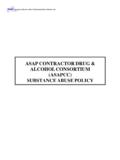Transcription of Ethical issues in workplace drug testing in Europe - …
1 INTERNATIONAL LABOUR OFFICE Ethical issues in workplace drug testing in Europe prepared by Behrouz Shahandeh and Joannah Caborn SafeWork ILO Geneva for Seminar on Ethics, Professional Standards and drug Addiction Strasbourg, 6 7 February 2003 organized by Co-operation Group to Combat drug Abuse and Illicit Trafficking in Drugs Council of Europe Pompidou Group 2 Ethical issues in workplace drug testing in Europe by Behrouz Shahandeh and Joannah Caborn Introduction workplace drug testing remains a sensitive issue because of the difficulty of balancing safety and productivity requirements against the essential need to prevent the invasion of privacy and discrimination. The contentiousness of workplace drug testing (WDT) arises out of the collision between workers and employers interests. Definitions of personal liberty and dignity clash with questions of social responsibility and economic productivity.
2 In addition there are data protection issues and strict requirements for the assurance of reliable test quality. In this paper drug testing is defined as the process of obtaining samples of body fluids or tissues ( urine, blood, hair, breath) from job applicants and employees and conducting laboratory analyses to detect the presence of certain drugs, including alcohol, and their metabolites (Hanson 1993: 5). The range of testing carried out in the workplace includes the following: - Pre-employment testing ; - Probable cause testing ; - Reasonable suspicion testing ; - Periodic testing ; - Random testing ; - testing on return from treatment; - testing related to transfer or promotion; and - Voluntary testing (M rland 1993). While all these forms of drug testing raise issues of concern, it is random testing that is the most controversial and is accompanied by vehement arguments for and against. For this reason, this paper focuses mainly on random testing in the workplace .
3 To guide employers and workers through the dilemmas surrounding the issue of WDT, in 1993 the ILO instituted a tripartite meeting of experts which resulted in the creation of the ILO Guiding Principles on 3 drug and Alcohol testing in the workplace . They were published as an annex to the ILO Code of Practice on the management of alcohol- and drug -related issues in the workplace . Despite the controversies surrounding WDT, laboratories carrying out tests, for example in Ireland, the Netherlands, Norway and the United Kingdom report ever increasing demands for their services. Given the wide range of sensitive issues involved, WDT is handled in a variety of ways in European countries. This paper will give an overview of the Ethical questions concerning WDT and related arguments for and against testing . It will include some impressions of the current extent of WDT in different European countries and how the level and frequency of testing is connected with the Ethical stance.
4 The paper will also summarize the outcomes and pose certain questions on the more controversial aspects for discussion in the workshop. Safety The most frequently used argument for WDT and one of the least controversial is to ensure safety. Workers in safety-sensitive positions should not be under the influence of drugs1 because of the danger to themselves, their colleagues and third parties. There is however no universally accepted definition of what constitutes a safety-sensitive job. As a result, the employer has some leeway in deciding which workers should be subjected to tests for safety reasons. This leeway is open to interpretation in different European countries and in various branches of industry. In a case in Denmark, and in the transport industry where safety concerns are paramount, the labour court agreed with a ferry company s definition of safety-sensitive covering the entire crew of their ships and rejected the unions complaint.
5 In Switzerland on the other hand, the Data Protection Commission ordered a major pharmaceutical company to end their testing programme for trainees because of a lack of safety interest, although work with chemicals is often seen as typically safety-sensitive. The safety argument has been extended from the traditional question of health-related safety to business-related safety . It is argued that inappropriate use of drugs and alcohol can create business-critical situations, in which poor decisions could cost the company large amounts of money. However this argument is not accepted in all European countries, which is reflected in the varying extent of testing and the legal restrictions on testing . For example in France, Norway and the Netherlands, only workers in traditional safety-sensitive positions are subjected to testing in any form. Accordingly there is less testing and there are more legal restrictions in these countries.
6 In the Netherlands pre-employment testing is illegal, and in France only the occupational physician may decide to conduct drug tests, not the employer. On the other hand in British and Swedish companies where testing takes place WDT is often applied to workers in all types of jobs in order to ensure business-safety . The legal liability for health and safety is the basis for a further argument for the introduction of testing programmes. The legal responsibility for ensuring occupational safety and health lies in the majority of European countries with the employer, who has a duty of care to exercise due diligence to make 1 For ease of reference in this paper the term drugs will be used to refer to both alcohol and illegal drugs such as cannabis, cocaine and heroine, unless otherwise specified. 4 sure that the workplace is Any tightening of corporate liability could increase testing prevalence.
7 For example in the United Kingdom for the past two years the government has been trying to introduce a corporate manslaughter bill which would make company directors personally liable for preventable occupational accidents (Bright 2002). If passed, this bill could lead to an increase in the number of testing The Moral Argument A further motivation for WDT comes from quite a different angle. Some proponents of WDT take a moral stance based in part on the illegal status of some of the drugs and in part on a value judgement that drug use of any sort is morally reprehensible. In such cases the employer assumes a social responsibility to influence the values of the workers. Employers often maintain that testing is the only way to tell if a worker is using drugs. This argument reveals that the moral argument differs considerably from the safety, business and prosecution arguments in that it is not related to performance. In the words of a director of a human resources department quoted in the British journal Personnel Today: A main reason why drug abuse is difficult to spot is that it can contradict the myth of deteriorating performance.
8 Some abusers can perform consistently well over long periods (Personnel Today 2001) In moral arguments usually no distinction is made between drug use and abuse. Whilst this may be appropriate for the moral point of view, the consequences for the worker of a positive drug test should be relevant to the drug use pattern of the individual. The question of who should be tested has already been touched on concerning the business-critical argument for WDT. For business-critical and morally based testing programmes to be plausible everybody working in the company or organization should be tested. Every employee s work is relevant to the productivity of the company and moral concerns apply to every human being. For this reason testing programmes which only apply to trainees are open to the accusation of being discriminatory to youth. As an alternative to testing all people working in an organization, a policy can be introduced of only testing in case of suspicion of drug use.
9 Many union organizations, for example in the Deutscher Gewerkschaftsbund (DGB) in Germany, the sterreichischer Gewerkschaftsbund ( GB) in Austria and the Conf d ration G n rale de Travail (CGT) in France favour this approach, which is compatible with performance-based reasons for testing for safety, for business and for fear of prosecution. However in Sweden, where testing is more widespread, a test case concerning the issue of suspicion failed to convince the labour court. A member of the cleaning staff in a nuclear power plant objected to being tested because there was no suspicion against her and she was not in a safety-sensitive position. The labour court ruled that she was compelled to comply with the written company policy to test all staff, which had been formulated with the agreement of both trade unions represented in the plant. 2 This principle is also espoused in ILO Convention 155 on Occupational Safety and Health.
10 3 It should be noted that there are alternatives to WDT, such as other clinical tests, better trained supervisors, etc. for managers wishing to ensure safety at the workplace . 5 Deterrence Increasingly the aim of introducing a testing programme is deterrence from drug use of any kind. This contrasts with the attitude in the late 1980's when drug testing was perceived as a tool to detect and dismiss drug -abusing workers. Deterrence as the aim of a WDT programme is compatible with both performance-based reasons and the moral motivation to test outlined above, because of its inherent preventive component. The current stance of many employers organizations, for example in the Schweizerischer Gewerkschaftsbund (SGB) in Switzerland, Svenskt N ringsliv in Sweden and the London Chamber of Commerce in the United Kingdom, is to recommend adopting a deterrence programme ( including sanctions) but to frame it in a package of assistance for those with drug problems.






